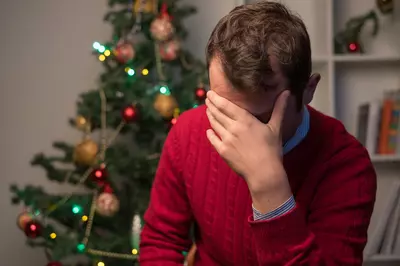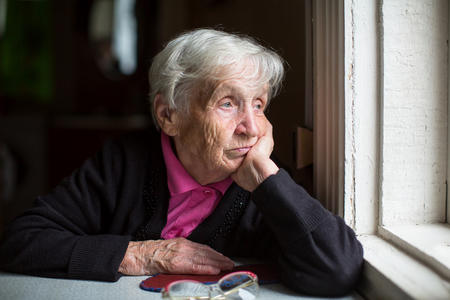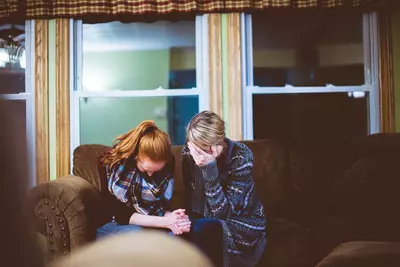When the Holidays Aren't Joyful

The scene has played out a thousand times in movies, books, and television: A family gathers for the winter holidays, cousins and siblings and children greeting one another with joyful hugs at the door of a twinkling house. Inside, a feast has been prepared, presents are exchanged, and the sound of happy music fills the air as snow falls gently outside.
It’s a lovely idea, but this scenario doesn’t match the experience of many people. In reality, the winter holidays may look quite different: perhaps there is no family gathering because a divorce has created a divide, or plane tickets are too expensive to afford. Maybe no gifts are exchanged because layoffs have left a devastating financial hardship in the family. Perhaps those who struggle with seasonal depression simply can’t muster the enthusiasm that feels mandatory this time of year.
In short, for many people, the winter holidays bring a sense of dread, anxiety, and even depression.
What are the holiday blues?
 Feeling blue around the holidays is very common and includes symptoms such as worry, depression, feeling isolated, and an inability to enjoy festivities. According to a survey taken by the National Alliance on Mental Illness, 66% of people feel lonely around the holidays, with half of respondents reporting they were unable to be with loved ones. Research by the American Psychological Association found that over 90% of people experience additional fatigue around the holidays, and over 80% experience more stress than usual. Women and people with low incomes are most likely to feel the burden.
Feeling blue around the holidays is very common and includes symptoms such as worry, depression, feeling isolated, and an inability to enjoy festivities. According to a survey taken by the National Alliance on Mental Illness, 66% of people feel lonely around the holidays, with half of respondents reporting they were unable to be with loved ones. Research by the American Psychological Association found that over 90% of people experience additional fatigue around the holidays, and over 80% experience more stress than usual. Women and people with low incomes are most likely to feel the burden.
Although an oft-repeated rumor that suicide rates rise around the holidays has been debunked (it’s not true at all - in fact, suicide rates are at their lowest during the winter), stories of seasonal depression and anxiety are so widely reported that the phenomenon should be taken seriously. According to NAMI, 64% of people with mental illness say the holidays make their condition worse.
What causes holiday blues?
Feeling down during the holidays is actually not that unexpected. There are many reasons depression or loneliness might be triggered, including:
- Not having family or being confronted with complicated family relationships
- A cultural expectation to be joyful
- Pressure to spend more money on gifts
- Cold weather, less sun, shorter days (for some)
- Eating more unhealthy foods and drinking more alcohol than usual
- Stress of arranging time off work to visit family or travel
- Feeling isolated if you don’t participate in a religious holiday
- Unsuccessful attempts to recreate holidays from childhood
What to do when the holidays bring you down
While the holiday blues are common, that doesn’t mean they are inevitable - and there is no need to suffer silently. If you have ongoing mental health issues or experience particularly severe symptoms, consult your healthcare provider.
There are also many things you can do to alleviate the stress and negative feelings triggered this time of year. Here are some of our suggestions for how to deal with common triggers.

Financial strain
Gift-giving can actually be a huge boost to our wellbeing, as long as we aren’t emptying out our bank account. If you can, avoid the commercialized pressure to spend and instead offer the gift of your time: offer to watch your sister’s kids while she and her partner go out for a night, or make handmade gifts that feel more meaningful. We’ve got more tips on mindful gift giving if you need ideas.

High expectations
If you find yourself constantly disappointed that the holidays don’t live up to the hype portrayed in the media, or don’t compare to your childhood memories, step outside of the prison of expectations and try to live in the present. Pay attention to the little things, not the big ones - the family party may not go as smoothly as planned, but if you stop and listen to the sounds of your children laughing, or let a piece of chocolate sit on your tongue a few moments longer, gratitude - not stress - will arise.

Family conflicts
Whether it’s political arguments at the dinner table or cousins who aren’t speaking, each family has its own unique conflicts. Cultivating empathy and compassion for your family can help you deal with the resentment, irritation, and impatience that can arise, and these practices can even leave you feeling more loving and connected. Don’t just save it for the holiday, though - nurture your relationships year-round.

Feeling unwell
While the holidays may feel like a “break” from your healthy-eating habits and exercise plan, you are not immune to the impact of eating too many sugary cookies or lying on the couch watching movies your entire week off. Be sure to set aside time to take care of your body by eating nutrient-dense foods, getting enough sleep, minimizing alcohol consumption, and moving your body. Taking a post-dinner walk with family or friends can be a great way to nurture your body and relationships at once.

Loneliness
If you don’t have family or friends to spend the holidays with, think outside the box. There are many ways to connect with others who might also be feeling isolated, such as volunteering at a soup kitchen or visiting a senior living facility. If you're far from home, technology can bring long-distance families closer through a group chat or video call. You can also simply spend time caring for yourself in a meaningful way, by connecting with nature, listening to music, or doing something else that gives you a sense of purpose.

Stressful travel
Holidays are often anything but relaxing, especially when you’re stuck on a plane or in a car for half the time. Check in on your reactions to travel-related stressors, such as delays or claustrophobia - do your responses lead you to spiral into depression and anxiety, or are they healthy ways of coping that help you relax? Before you leave, practice a few relaxation techniques you can use whenever you feel yourself tightening. Be sure to travel safely and mindfully, and turn your mind toward positivity when you feel able.
Remember: one of the reasons people feel down around the holidays is that they assume they are the only ones who feel this way, and that everyone else is enjoying that picture-perfect scene from the movies. If you struggle this time of year, take heart knowing that you are not the only one.